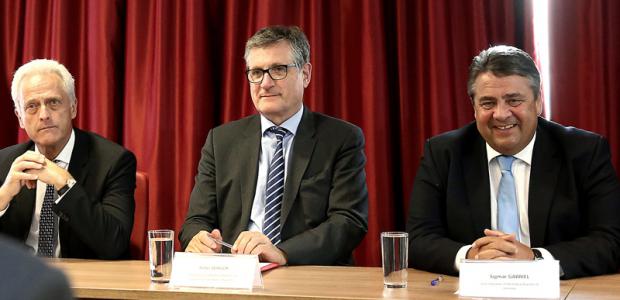Leading Greek and German officials have signed two agreements, one for provision of German knowhow to support renewable energy (RES) development in Greece, especially the non-interconnected islands, and another to promote exports.
The agreements were signed by Greece’s Environment and Energy Minister Panos Skourletis, the country’s Economy, Development and Tourism Minister Giorgos Stathakis, and German Vice Chancellor Sigmar Gabriel, also Minister for Economic Affairs and Energy, in Athens last Friday following an energy conference focused on the Greek and German energy sectors beyond 2020.
Gabriel, while delivering a speech at the event, noted that environmentally friendly policies and economic development ultimately do not contravene each other. He cited Germany’s decision, reached in 2011, to phase out nuclear power plants by 2022, as an example. The change of course has cost Germany 30,000 nuclear-linked jobs but created 300,000 new jobs through the country’s RES sector development, Gabriel told the conference.
The visiting German politician stressed the need for a switch from petrol to renewable energy for electricity production on the Greek islands, as well as for a need to reduce electricity costs in Greece, currently well above the EU average.
Gabriel stressed that 80 percent of German RES power production is exported, noting that Greek and German collaboration could lead to such prospects for Greece.
Stathakis, Greece’s Economy, Development and Tourism Minister, told the conference that the recent completion of the first review of the country’s third bailout package offers potential for the beginning of an economic rebound within 2016.
He said a new development law aims to support small and medium-sized enterprises, including in energy, as it will facilitate development of various ventures, including small-scale hydropower stations, RES units, biofuel facilities and hybrid stations on non-interconnected islands.
Skourletis, Greece’s Energy Minister, said the new support system for the RES sector will eliminate market distortions and promises to create a stable and secure environment for investors. Greece’s energy sector future beyond 2020 includes greater RES penetration, development of energy efficiency and storage systems, electric car usage growth, and eco-friendly islands, he noted.
The minister added that reducing energy costs by interconnecting the Greek islands with the mainland grid, an initiative, which he said, will also help further boost Greece’s tourism economy, stands as a key objective.





